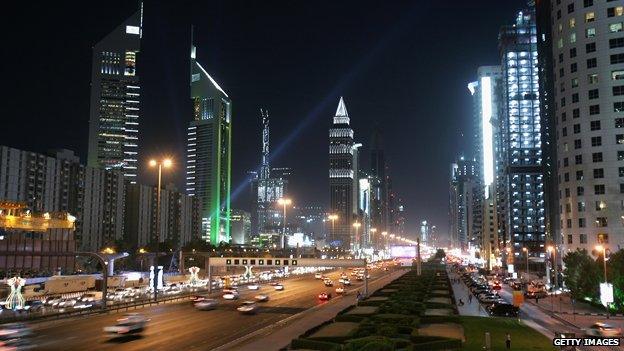Why did UKIP do less well in London?
- Published
- comments

How much of the rise in Europe's anti-establishment parties of right and left is cyclical and how much is long-term and secular?
Is the new popularity of anti-EU parties in the UK, France, Greece and Spain a hangover from the crash of 2007-8, the euro crisis of 2010-13 and long years of squeezed living standards - a protest from those who feel dispossessed in an economic sense?
Or does the surge of UKIP, the Front National and Syriza, inter alia, reflect a more profound sense that the mainstream parties and conventional political institutions no longer serve the interests of millions of people?
Is it "the economy, stupid", or is it "globalisation and a dysfunctional EU, stupid"?
The answer matters.
Maybe the economy is easier to fix - although not necessarily in the eurozone, which still lacks the requisite cross-border political solidarity that would allow the excessive debt burden to be pooled, and its growth-deadening impact to be mitigated.
As for the UK, it is possible that the current economic recovery will suddenly translate into a significant rise in living standards, that has been so elusive for six years. But the prime minister might not be best advised to count on it.
A significant microcosm of both the problem and the solution is London - where, significantly, UKIP resonated less and performed less well than elsewhere.
Part of the explanation is that globalisation - which gives many a sense that they have little direct control over their economic destiny - enriches London.
Much of the rest of the UK sees globalisation and its manifestations - such as immigration - as disempowering, impoverishing and a threat. Whereas for Londoners, globalisation is an economic competition they are apparently winning.
Of course, there are tensions within London generated by the nature of its success - the west London ghettoes of the non-dom super-rich aren't everyone's cup of tea, and high and inflationary property prices undermine social cohesion.
But I haven't heard many Londoners describe the capital as "the dark star of the economy", which is how it was characterised in March by the First Minister of Scotland, Alex Salmond.
The capital's gravitational pull for what Mr Salmond called "resources, people and energy" is bound to be seen with different degrees of enthusiasm by those inside and outside the Great Wen.
Alex Salmond's hope was that an independent Scotland would be able to exert a new pull for talent and money, and provide more economic balance in this island.
Which some would say is a challenging argument to make, since the trends that are pumping up London are supra-national. In a world where barriers to the flow of money, services, people, goods and data have progressively been removed, vast flows of money, services, people, goods and data are drawn to where they find their ilk.
Or to put it another way, the rise of London is the rise of one of the world's megacities, those urban centres which thrive semi-independently of the countries where they are located.
According to the consultancy McKinsey, some 70% of all worldwide economic activity takes place in the world's 600 largest cities. And the most vital cities, on its analysis, are those that are most connected by becoming hubs or waypoints for skilled people, for goods, for services, for capital, and for data.
On this view, London is one of only six truly connected cities, along with New York, Dubai, Hong Kong, Singapore and Tokyo. London scores relatively poorly only for goods traffic.

Dubai - one of the world's "most truly connected" cities, along with London and four others
What is striking about this half-dozen of the global elite metropolises is that three of them, Dubai, Hong Kong and Singapore, are city-states.
So it is not surprising that London is seen by some, including seemingly Mayor Johnson periodically, as extra the UK, almost a city-state.
Inevitably therefore one of the big political and economic questions of our age is whether national governments should encourage or attempt to stifle the rise and rise of these great cities - because they can be seen not only as economically over-mighty but politically too.
The British government sees London as a great asset to be nurtured - punching above its weight in respect of tax generation and helping to sell the UK to the rest of the world.
So it will probably see the latest forecast by the CEBR of London's growth as a reason to be cheerful. The CEBR sees London as accounting for almost a third of all UK growth in the next five years.
The CEBR expects the London economy to expand by 15.4% till 2019, faster than other UK regions, and compared with 10.7% for the UK as a whole.
Which means that London's share of the total British economy will continue to grow. According to official figures, the output or gross value added of London was 21% of UK output in 2007. It had risen to 22% in 2011, and if the CEBR is right, London will be nudging a quarter of the entire UK economy by 2019.
Looked at in that way, it is pretty difficult to see how London could be put back in its box, even if the government wished to do this, without doing serious harm to the nation's finances and prosperity.
If London's growth were to slow considerably, then revenue generation for the government and employment creation for the country would also slow - probably harmfully.
So for those who want a more regionally balanced UK economy, the trick presumably is to spur faster growth outside London.
But that has been the ambition of so many governments, for so long. And has arguably become even harder in a world where capital seems increasingly drawn to capitals (very bad pun, sorry).
Or to put it another way, the problem isn't London. The problem (if there is one) is that globalisation is all about how money, data and skilled people do what they want and go where they want.
Which implies the task of government is to harness and tame capital's love of metropolises in such a way that London and its peers are seen as engines of national wealth creation, and providers of national resources that otherwise would not be affordable.
That said, if globalisation means that the rise of London and other outward looking megacities is unstoppable, it is difficult to see how the economic gap between capital and provinces can do anything but continue to widen.
And whether redistribution of wealth from urban centre to the rest of the country will allay the legitimate fears of many outside the megacities that the global economy is not run for them, well that is moot.